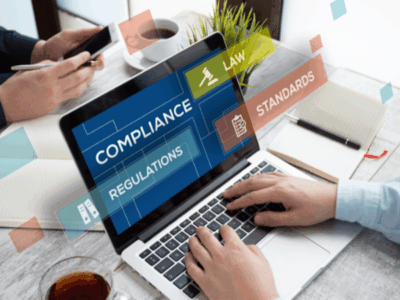Public Procurement: The Role of The Public Procurement Officer
This article will go into depth about what public procurement is, how the process works, what public procurement officers do, and more so you can decide if you want to pursue a career in this field.

Summary
Have you always wanted to work in the public sector as a government official? Are you someone with a deep passion for helping the community and aiding economic development?
If so then you’ll be pleased to know that MANCOSA offers a Higher Certificate in Public Procurement that’ll teach you everything you need to know to work in the public sector as a procurement officer.
But what exactly is public procurement? How does it work? And, what would your job responsibilities be working in this sector? So many questions. Fortunately, we do have all the answers.
This article will go into depth about what public procurement is, how the process works, what public procurement officers do, and more so you can decide if you want to pursue a career in this field.
What is public procurement, and how does it work?
Public procurement is the purchase of goods, services, and work by governmental departments and state-owned enterprises.
These public authority enterprises use a substantial portion of the taxpayers’ money to make these purchases. Thus, they’re expected to carry it out efficiently and spend the money wisely to ensure top-quality service to the public.
Public procurement is an essential part of all state-owned organisations around the world. In fact, global public procurement represents an average of 13%–20% of the Gross Domestic Product (GDP).
Procurement duties include:
- Creating a purchase requisition
- Researching the market
- Shortlisting suppliers
- Qualifying suppliers
- Negotiating terms and costs
- And more
How is public procurement different from private procurement?
While public procurement is primarily affiliated with government organisations (either local or national), private procurement happens for privately owned organisations.
Thus, privately owned businesses are responsible for funding the purchase of their goods and services through the company’s income and revenue.
Often, this leads to private organisations having far more flexible budgets since they can easily transfer money from different departments, while public budgets are carefully distributed and delegated.
The role of public procurement & tender management
Public procurement is a necessary strategic development that’s vital to effective governance and efficient use of public resources. It ultimately aids in providing higher levels of service delivery to the public and helps achieve public policy goals.
So, how does the public procurement process work?
Public procurement often makes use of tenders. In public procurement, the term “public tender” refers to a contract opportunity that the government organisation publishes — which opens the door for several suppliers to provide the goods or services that the organisation needs.
The public procurement officer and their team will decide which supplier they want to work with based on the price, quality, and predetermined criteria.
Here are some of the main benefits of public procurement:
Furthermore, private sector organisations might also have fewer restrictions on how procurement must be performed.
- Increased availability of public resources: Effective procurement leads to the continuity of goods and services, resulting in more sustainable resources. As such, procurement teams can ensure continuous resource availability by focusing on long-term purchase requirements.
- Lowered costs: Procurement and its costs come down to a single aspect — planning. Purchases can cost far less when properly planned since the procurement team has the upper hand. They also have a far better negotiation standing, which means suppliers or vendors will sell the same goods to them for lower prices.
- Decreased supplier risk: There’s always a risk involved when dealing with outside third parties, whether it be a legal risk, financial risk, etc. Having a procurement system in place can help identify and prevent these risks from happening.
The role of a public procurement officer
A public procurement officer, also known as a purchasing manager, is responsible for purchasing goods and services for the public organisation they work for.
They need to ensure that the organisation’s budget and resources are spent wisely so that processes and results can be effective.
Here are some of their primary responsibilities:
Oversee staff
Procurement officers oversee the department’s staff and activities that deal with purchases. They must assign duties to the staff members and monitor and review them.
They need to be knowledgeable on procurement procedures and hire and train the right people to ensure processes flow smoothly. They also need to stay in line with procurement policies.
Buying goods and services
The procurement officer manages all activities related to purchasing goods, services, work, and supplies.
They’re responsible for looking at different product and service options, approving, and buying those with the lowest costs. In addition to low prices, they also need to ensure that the products or services are of high quality to guarantee the best service can be delivered to the public.
Ensure legal compliance
Procurement managers also need to ensure that all processes, including the identification, negotiation, and purchase of goods and services, are done according to the organisation’s policies and government regulations.
Communicate and negotiate with vendors
Communication and negotiation skills are a must for procurement officers. This is because a big part of their job involves speaking to and negotiating with suppliers and vendors.
Not only do they need to find the best vendors that provide high-quality products and services, but they also need to negotiate continuously for lower prices.
Furthermore, they need to maintain a good relationship with these vendors. This way, they can continue to get the best deals.
Handle data
Regardless of the type of purchases that are being made — whether goods or services — the procurement officer must keep it on record.
Additionally, they must maintain all documents or data related to their vendors and suppliers. This way, they’ll always know which vendor is responsible for which goods or services.
Study for a Higher Certificate in Public Procurement with MANCOSA
After reading this article, does public procurement and public management sound interesting to you? Do you see yourself working as part of a public procurement team for a state-owned organisation?
If so, there are various public procurement courses online that you can consider.
Have a look at MANCOSA’s Higher Certificate in Public Sector Procurement to see if this is your ideal career path. Alternatively, you can also look at the Higher Certificate in Supply Chain Management, which also deals with purchasing.





